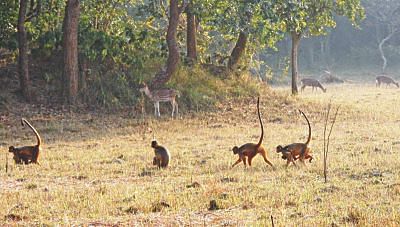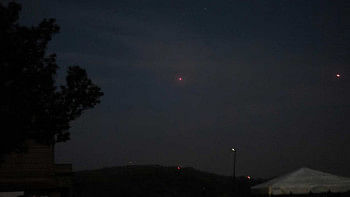<i>Miseries of Madhupur wildlife </i>

Deer and monkeys look for food in Dokhala area of Madhupur forest. The helpless animals often invade the neighbouring villages when food crisis turns acute, especially during the winter season.Photo: STAR
Driven by hunger and loss of habitat, a wide range of wildlife from Madhupur forest is regularly invading adjacent villages, locals and forest officials said.
In course of events, hungry mammals like boars, monkeys, hanumans, squirrels and deer are also getting killed regularly while crossing the busy Tangail-Mymensingh highway that crisscrosses the forest.
The situation deals a blow to the dwindling number of animals in the Madhupur forest which was, not long ago, very rich in wildlife, plants and trees.
Only 20 years ago, the Madhupur forest abounded with monkeys, hanumans, squirrels, deer, fowls, porcupines, hares, wild boars, jackals, fishing cats, civets, lizards, and different kinds of snakes including big pythons and birds.
Forest department sources said, since the independence of the country, the forest shrunk to an area of 10,000 acres from 45,565 acres. Indiscriminate felling of trees, poaching and increasing human population in the areas have contributed to near destruction of this rare forest.
Forest department office in Madhupur estimates that at present 300 to 400 monkeys, around 100 hanumans, several thousand squirrels, nearly 100 deer, including 70 spotted ones at the breeding centre, some wild fowls, jackals and snakes have managed to survive.
Monkeys, hanumans, squirrels and deer are mainly dependant on different fruits, including mango, jackfruit, berries, kaika, dumur, ajuli, bohera, amloki and fresh leaves of different plants, which are now scanty in the forest.
Winter is not the season for mango and jackfruit. Some berries are still found in the forest, but other wild and medicinal fruit trees have almost disappeared from the forest.
The hungry animals often move around the quarters of the forest department staffs, villages and outside the forests and sometimes go near the tourists who come here for picnic.
The 70 spotted deer which are kept in a pen inside the boundary at the breeding centre of Dokhala Range area are fed by the authorities. But the barking deer at large face acute food crisis as bohera and ajuli trees are now rare in the forest. The ground of the entire forest have also become devoid of grass and shrubs due to dryness.
“The winter season, especially the period between January and March, is very hard time for the wildlife in the forests,†said Rajesh Chakma, Assistant Conservator of Forest (ACF) in Madhupur.
“We have been getting some help for feeding the deer at the breeding centre which is very insufficient. Though the deer should be given food thrice a day, we are unable to feed them more than once for want of fund,†he said.
“Allocation of fund is needed also for buying food for the desperate monkeys and hanumans at large,†the ACF added.
Hungry primates are now entering the villages of the indigenous people, stealing foods and also eating up fruits especially banana from their plantations, said elderly locals Ajoya Mre and Eugene Nokrek.
On January 19, five monkeys got on a banana-laden truck from Madhupur which was passing through the forest.
Sensing their presence, the driver stopped the truck at Rauti in Tarail upazila of Kishoreganj.
At this, the five mammals fled the scene only to be displaced and shelterless, said Saiful Islam, Tarail upazila livestock officer.
Asit Ranjan Paul, Divisional Forest Officer (DFO) in Madhupur, told this correspondent that the food crisis of the wildlife would come down in a few years as they have already planted 19 varieties, including several fruit trees on 20 hectares of forest land for the wildlife.
“I will write to the higher authorities to allocate more fund for feeding the monkeys and hanumans and also to increase allocation for feeding the deer at the breeding centre,†the DFO added.

 For all latest news, follow The Daily Star's Google News channel.
For all latest news, follow The Daily Star's Google News channel. 



Comments